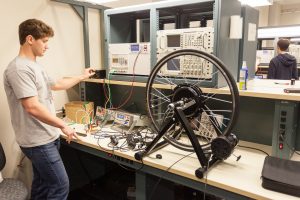
During fall quarter, students in Brian Johnson’s e-bike class designed and built a circuit board that could supply power to an e-bike. Shown here Cole Ballard tests a power circuit during lab in fall quarter. Photo by Ryan Hoover/UW ECE
Adapted from a story by Sarah McQuate | UW News
When the University of Washington (UW) announced it was moving its spring quarter 2020 classes entirely online to combat the novel coronavirus, instructors across campus faced a new, uncharted challenge.
Professors and lecturers across the university take pride in providing hands-on opportunities for their students, but also felt reluctant to outright cancel their courses this quarter, often citing graduation or major requirements.
Of the approximately 7,000 courses the UW typically offers across its three campuses during spring quarter, about 400 have been canceled — many of which were one-on-one instruction and practical training, according to Philip Reid, UW’s vice provost for academic and student affairs. In addition, about 200 classes were added to spring quarter and the enrollment caps were increased in an effort to limit impacts to student academic progress.
UW instructors have taken a variety of approaches to give students as close to an in-person experience as possible. Many have figured out ways for students to be hands on at home. But others took different approaches — such as using online platforms to promote student engagement or having students analyze datasets from a previous quarter.
Student enrollment also remains high. As of the start of the quarter, 52,845 students were registered for at least one course, compared to 51,884 students last spring. Two weeks into the quarter, about 930 students had withdrawn, compared to 600 at the same time last spring — a difference of about 330.
Labs at home

Brian Johnson, Washington Research Foundation Innovation Assistant Professor of Clean Energy and Electrical & Computer Engineering
In the move to online courses, many instructors are devising ways to shift in-class projects to activities students can do at home.
Brian Johnson, a UW assistant professor of electrical and computer engineering, has been restructuring a power electronics course into a year-long series of classes where students design and build electric bikes. This school year was the first full run of the sequence. In fall 2019, students designed the electronics necessary to power an e-bike. Then, over winter quarter, they shifted gears to develop the code that would regulate the system. Spring quarter was supposed to be the “Tour de France,” where the students put the pieces together to power and control actual e-bikes that they would race at the end of the quarter.
“I did my best to distill everything into something they can build at home,” Johnson said. “Instead of using a battery to power an e-bike motor, their circuits will transfer energy from a small power supply to resistors which will warm up slightly. It will be a great learning experience and it will require students to carefully plan their builds.”
Instructors from other College of Engineering courses are having their students complete lab work at home as well. After modifying experiments so that they would be safe to perform at home, instructors prepared and sent more than 300 kits for six different courses to students across the state — including to Spokane, Yakima, Bellingham, Chehalis and Aberdeen — and around the globe to students in China, India, Uganda and Brazil, among other countries.
“It’s heartening that even in this unprecedented time, we still see the resiliency of our community through our innovative instructors and our students who are eager to learn,” Reid said.
Read the full story about how instructors across the UW campus are adapting to an online teaching environment in UW News.

